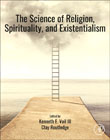
The Science of Religion, Spirituality, and Existentialism
Vail III, Kenneth E.
Routledge, Clay
The Science of Religion, Spirituality, and Existentialism presents in-depth analysis of the core psychological drivers of religion and religious-like concepts, beliefs, identities, and practices. The book is organized around four key existential themes-death, freedom, isolation, and meaning. Leading scholars cover multiple levels of analysis (motivational forces, social and cultural forces, individual differences, cognitive and neuroscientific mechanisms, and physical and mental health outcomes). Not only does the book explore the contours and frontiers of the existential science of religion, but it also helps answer the big question of why religious belief remains such a central feature of the human experience. Examines how faith can stem from basic cognitive and emotional processesDiscusses the cause and consequences of individual and cultural differences in religion and spiritualityApplies religious motivation to art, creativity, science, nature, and social justice, war, terrorism, and well-beingCovers concepts such as theory of mind, dual processing, concept acquisition, and emotion regulation INDICE: 1. The awareness of death and religious/spiritual belief: TMT2. Explicit death anxiety and religious belief3. Face to face with death: Coping with direct, concrete threat4. Near-death experience: The mystical feeling of crossing over? and its impact on faith and spirituality5. Reactance and spiritual possibilities6. Freedom as a Cross to bear: Choice-overload, decision fatigue, burdens of responsibility, and trust in God and religion7. A self-determined soul: The role of autonomy in religious life8. A goals perspective on religion and spirituality9. Religion, free will, and effective self-regulation10. Religion and the illusion of free will11. Social exclusion, loneliness, and religion12. I-sharing as a window to the soul13. Religion, close relationships, and attachment to god14. Religious groups: Identity, entitativity, belonging, and conflict15. Religion and the epistemic need to know16. Religion as a shared reality17. Uncertainty, identity, and religious system justification18. Religion and meaning-maintenance in everyday life19. Spiritual meaning-making and stressful life events20. Meaning, religious/spiritual struggles, and well-being21. Evolution in the existential science of religion22. Cognition in the existential science of religion23. Emotion and emotion regulation in the existential science of religion24. Morality in the existential science of religion25. Existential neuroscience of religion: A broad view26. Individual differences in religious defensiveness and growth-orientations27. Existential unbelief: Spirituality, agnosticism, atheism28. Existential concerns and religious modes of mindfulness29. Global expressions and cultural variations30. Creative expression and religion31. Religion, progress, and science32. Nature, women, and purity33. Church and state: God, government, and social justice34. Existential concern, religious belief, and aggressive and prosocial behavior35. Existential concerns, religious faith, and physical and mental health
- ISBN: 978-0-12-817204-9
- Editorial: Academic Press
- Encuadernacion: Rústica
- Páginas: 500
- Fecha Publicación: 01/04/2020
- Nº Volúmenes: 1
- Idioma: Inglés
